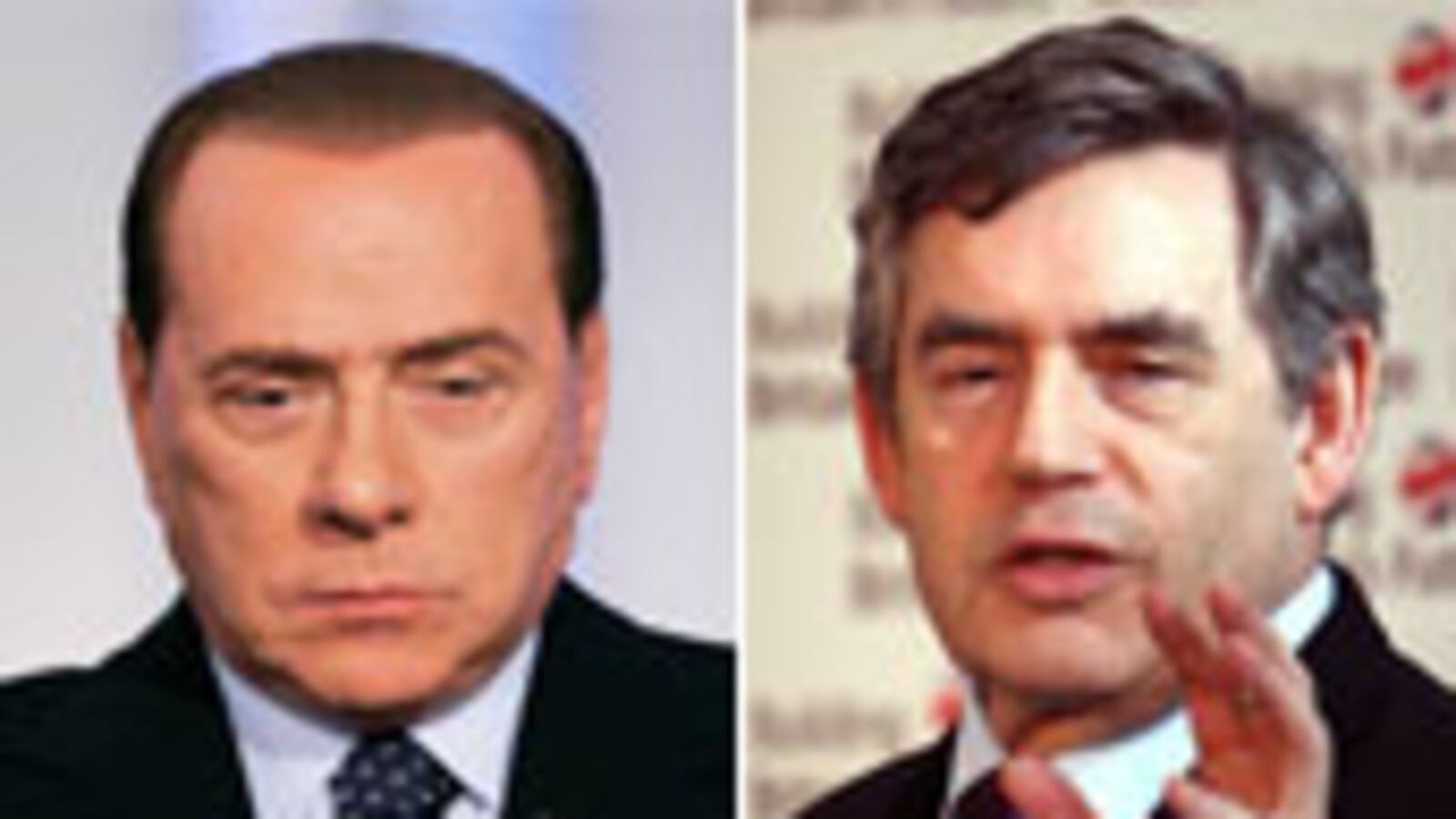
With the economy struggling across Europe, immigrant-bashing and law-and-order proved winning platforms. That spelled good news for one scandal-plagued politician (Silvio Berlusconi) and bad news for another (Gordon Brown), as E.U. Parliament elections gave big gains to conservative parties.
In Italy, there is a fine line between success and scandal. Topless party photos and allegations of an affair with an underage lingerie model that would have mortified most American politicians—and sunk their political careers—actually exalted the Italian leader, to judge by Sunday’s results from balloting to elect a new parliament for the European Union.
While winning by a smaller margin than in the last E.U. elections, Berlusconi’s party sailed through, securing a fine majority lead and underscoring the strength of his right-wing coalition government in Italy. He can gloat that what he called a smear campaign launched against him by political opponents over the last few weeks actually worked as an umbrella excuse for his slight slippage from previous years. "The electoral results will represent a terrible defeat for the left,” he said. “They substituted an electoral program—which they don't have—for calumny."
Record-low turnout—just 43 percent of some 390 million eligible voters—may tell the real story of disillusioned voters across the Eurozone
Berlusconi’s win in Italy coincides with the overall trend across Europe toward conservative, right-leaning leadership that is willing to act tough on issues such as illegal immigration and the economic crisis. Italy’s xenophobic Northern League party actually made the most gains of any party represented in his coalition by proposing strong measures against illegal immigrants. On a campaign visit to support the Northern League in Milan last week, Berlusconi remarked. "When I walk through the streets of central Milan and see the number of non-Italians, it seems that I am no longer in an Italian or European city, but in an African city.”
Support for such rhetoric was echoed across Europe, where the parties that fared the best were those that showed the least tolerance for outsiders and opposed further European Union expansion. Center-right groups with strong anti-immigration platforms won in Germany, France, and Poland.
The biggest loss came in the U.K., where the right-wing British National Party won its first seats in the European Parliament. Gordon Brown’s Labour Party, criticized for being soft on crime, suffered Europe’s most embarrassing defeat, winning just 16 percent, behind the conservatives and anti-Europe UKIP party. For many, this drubbing signaled the inevitable collapse of the current British government, and it prompted yet another resignation from a cabinet decimated by recent expense-account scandals. One of Brown’s staunchest allies, environment minister Jane Kennedy, stepped down and urged him to follow suit. “I can’t stand by any longer and say that I am content,” she said in her resignation statement. “He himself has said he wants to fight, but my feeling is that it will be ‘til the bitter end of the Labour Party.”
French election results had the opposite effect, giving Nicolas Sarkozy stronger-than-ever support to carry on his agenda. His UMP party won 27.4 percent against 17 percent for the opposition Socialist Party. As in Italy, his campaign platform included heavy-handed law-and-order promises to control urban crime and illegal immigration. He pledged to send more security forces to the poorest Paris suburbs to crack down on knife attacks and other violent crimes.
Overall, center-left candidates, blamed for mishandling the growing economic crisis, were defeated in Britian, Ireland, Spain, Latvia, Hungary, Bulgaria, and Greece. In the Netherlands, Geert Wilders’ Freedom Party, known for its anti-Islam rhetoric, won four parliament seats. In Hungary, the equally nationalistic Jobbik Party won two seats.. German Chancellor Angela Merkel held her earlier margins. Conservatives took 267 of the 735-seat European parliament with socialists getting only 159 and liberal democrats a paltry 81.
Nevertheless, "the results are an undeniable victory for those parties and candidates that support the European project," said European Commission President Jose Manuel Barroso, who will likely be nominated for a second term later this month. “They want to see the European Union delivering policy responses to their everyday concerns.”
But a record-low turnout—just 43 percent of some 390 million eligible voters—may tell the real story of disillusioned voters across the Eurozone. In 1979, voter turnout hovered around 62 percent.
Barbie Nadeau has reported from Italy for Newsweek magazine since 1997. She also writes for CNN Traveller, Budget Travel magazine and Frommer's.





